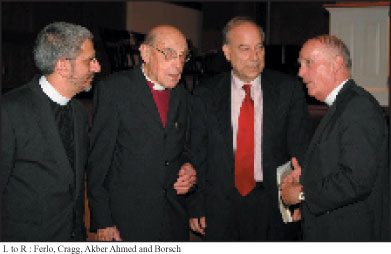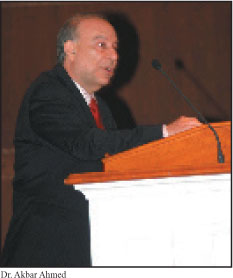
Scintillating
Christian Muslim Dialogue
in Washington
By Josh Hayden,
American University
Washington, DC: On
Tuesday, October 12 2004 at Virginia Theological Seminary
in Washington, DC, two prominent and distinguished
men representing the Christian and Islamic faiths
took the stage. Legendary Bishop of the Church of
England and author of The Call of the Minaret, Kenneth
Cragg joined in the dialogue with Dr. Akbar Ahmed,
Ibn Khaldun Chair of Islamic Studies at American University
and author of the renowned book, Islam Under Siege.
The purpose of the event was to promote understanding
and compassion between the Christian and Muslim faiths
in an era of harsh opposition and ignorance within
both parties.
Several notable Islamic and Christian scholars, ministers,
journalists, professors and community leaders were
in attendance in the auditorium, drawn not only by
the stature of the two men before them, but by the
urgency and significance of interfaith dialogue.

Bishop Fredrick
Borch introduced Dr. Ahmed, who delivered
an articulate lecture on the historical progression
of the relationship between the Abrahamic
faiths. He emphasized the interrelatedness
between Muslims and Christians, dating thousands
of years ago, but nearly forgotten today.
The notion of one God, values derived from
the Ten Commandments, sharing prominent prophets,
a holy book, the role of religious ‘mystics’,
and the afterlife were the similarities he
drew. Where Christianity and Islam differ
fundamentally, he said, is that Islam centers
on an idea (‘Islam’ means ‘peace’),
whereas Christianity derives from a person,
Jesus Christ.
As Dr. Ahmed began to describe the historical
relationship, his remarks focused on the role
and debate around the identity of Jesus as
the “Spirit of God” and reverence
for him by the great Muslim mainstream thinkers
called “Sufis.” He quoted Hafiz,
a famous Persian poet, among others, “I
am a hole in a flute by which blows the breath
of Christ, listen to this music.”
Dr. Ahmed traced three phases of the Muslim-Christian
relationship through the centuries; the period
of linkage and synthesis, the period of conflict
(the Crusades, colonization and the decline
of Muslim intellectual civilization and vitality)
and the phase of chaos and confusion marked
and begun by the tragedy of 9/11.
On the present state of affairs, Dr. Ahmed
pointed to the arrogance and ignorance of
understanding between the faiths and the lack
of discussion among leaders about putting
an end to this. Muslims have been called idol
worshippers and terrorists, an image largely
propagated and damaged by the media. Ahmed
pointed out the absurdity of Bin Laden becoming
a role model in his call of killing Christians
and Jews.
The way forward b etween the faiths, Dr. Ahmed
concluded, is to begin the process of understanding
each other, visible dialogue at a privileged
moment in history, creating friendships, and
beginning the process of the rediscovery of
the meaning of one’s faith on both sides.
He said that we must revert back to the fundamental
linkages and apply them to our present situations.
“I want Muslims to rediscover Jesus
and I want Christians to rediscover Jesus.
Jesus symbolizes compassion and peace,”
he stated. Just before he exited the podium,
he told the audience that we must use Jesus
as the key to the 21st Century in a world
of Christian-Muslim confrontation.
 Bishop Kenneth Cragg, who spoke earlier that
day at the seminary, followed Dr. Ahmed at
the podium with the same passion and eloquence.
Contrastingly to Dr. Ahmed, he emphasized
the differences between the exclusive claims
of the faiths, but similarly called for greater
understanding and interaction. He began by
stating that there is a fundamental crisis
in the West : the interrogative attitudes,
economic dominance, greed and arrogance in
the West have contributed to what he termed
a ‘political crime.’ Bishop Cragg
condemned war as an answer to terrorism and
said the problem must be confronted on moral
terms. He called for humility, patience, unison
of heart and purpose and a “coalition
of the truly persuaded” working towards
this end.
Bishop Kenneth Cragg, who spoke earlier that
day at the seminary, followed Dr. Ahmed at
the podium with the same passion and eloquence.
Contrastingly to Dr. Ahmed, he emphasized
the differences between the exclusive claims
of the faiths, but similarly called for greater
understanding and interaction. He began by
stating that there is a fundamental crisis
in the West : the interrogative attitudes,
economic dominance, greed and arrogance in
the West have contributed to what he termed
a ‘political crime.’ Bishop Cragg
condemned war as an answer to terrorism and
said the problem must be confronted on moral
terms. He called for humility, patience, unison
of heart and purpose and a “coalition
of the truly persuaded” working towards
this end.
Bishop Cragg, a scholar on Islam himself,
used two Islamic cities, Medina and Mecca,
as symbols to describe the crisis in the heart
of the Muslim faith. Mecca, the city of pilgrimage
for the Islamic faith, was held as a symbol
of compassion whose faith and devotion is
to be commended. Medina was associated with
the power equation of Al Qaida and the ideology
whose destiny is to dominate. Cragg exhorted
the return to the priority of Mecca and challenged
Muslims to push for civic and social equality
and “fulfill it to the common good”
in the providence of God.
Both men discussed the wonder of the Taj Mahal
in India as a means of understanding culture
and faith, although through divergent perspectives.
Dr. Ahmed described it as a monument to art
and intellect, revered for its beauty and
the imagination of its creator. He contrasted
it with a loss of Muslim respect and vitality.
Bishop Cragg pictured the Taj Mahal as a monument
to human grief and the love of man for woman.
The geometric patterns, orderly and cohesive
in structure, said Cragg, are an image of
Muslim ideology. According to Bishop Cragg,
the deeper significance and meaning behind
the emblematic structure brings us back to
the Christian answer to the nature and problem
of pain. It points to another human story,
he said, that lies with the tragic and it
is the brokenness of the cross and the love
of Christ.
On an evening at Virginia Theological Seminary
purposed to close the gap of understanding
between two faiths, the audience emotionally
rose to a standing ovation immediately following
both addresses. While Bishop Kenneth Cragg
stressed his concern for the distinctiveness
without contention between the faiths and
“commending not imposing” and
Dr. Akbar Ahmed underlined and proposed a
charge to return to the foundations of interrelatedness
between the faiths, the two distinguished
men joined in unison to be a voice of victory
over ignorance and arrogance that often pervades
both religious faiths. Both advocated further
attempts at similar interfaith dialogue and
underscored the urgency of Muslims and Christians
to again become a community where love and
mutual understanding are embraced.
-------------------------------------------------------------------------------------
|

